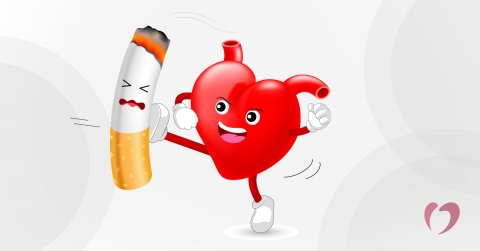Quit Smoking to Improve Your Heart Health

Smoking is the leading cause of preventable disease and death in the United States. It affects almost every organ in your body and has many repercussions for your heart. While current smokers may believe the damage has already been done, quitting smoking can have a dramatic positive impact on your health.
How does smoking affect heart health?
The chemicals that are inhaled when you smoke impact your heart and circulatory system in several ways, including:
- Increased plaque production, which raises the risk of coronary artery disease.
- Inflamed blood vessels, which contributes to atherosclerosis.
- Increased risk for blood clots.
These diseases make your heart work harder to pump blood and decrease the ability to provide oxygenated blood to all the other organs. Smoking also puts patients at higher risk of stroke, heart attack, and aneurysm.
The risk to heart health is present whether you are a light smoker or a heavy smoker. While smoking less often does carry less risk, the risk is far greater than a nonsmoker.
What benefits can people see by quitting smoking?
Quitting smoking has measurable benefits almost immediately. Within 20 minutes of your last cigarette, heart rate returns to normal. The carbon monoxide that smoking introduces to your blood reduces within 12 hours. By 12 months after your last smoke, heart attack risk is far lower than while you were smoking. Stroke risk begins decreasing and returns to non-smoker levels after four years of not smoking.
While some damage to the lungs and other parts of the body are irreversible, quitting smoking dramatically improves health outcomes. Quitting is one of the best ways of protecting your heart health and lowering risk of heart disease.
If you need help quitting smoking, reach out to OHH for resources and support to help you succeed. Your physician can help you develop a plan to quit smoking to improve your heart health.




